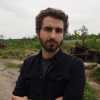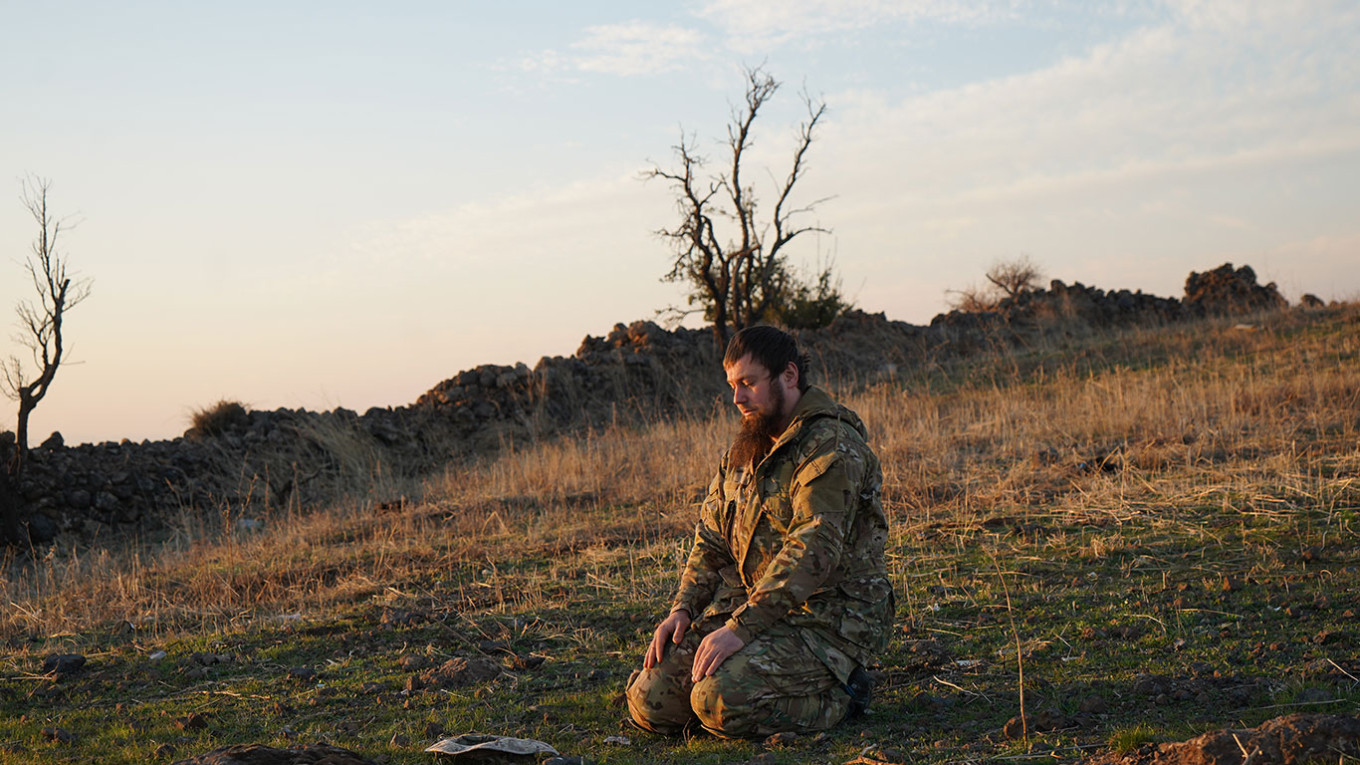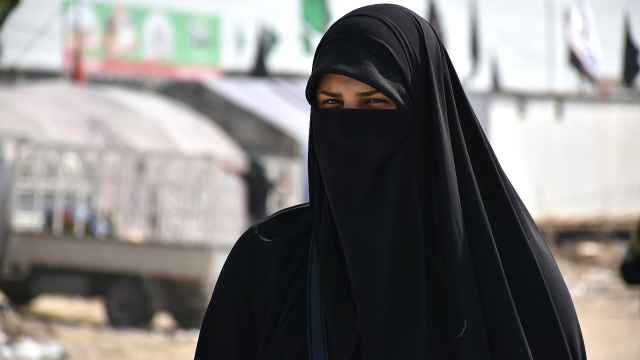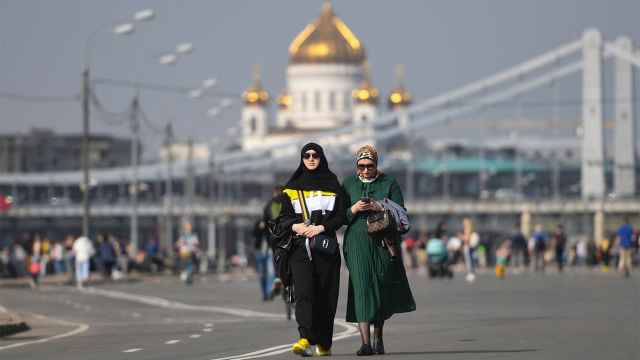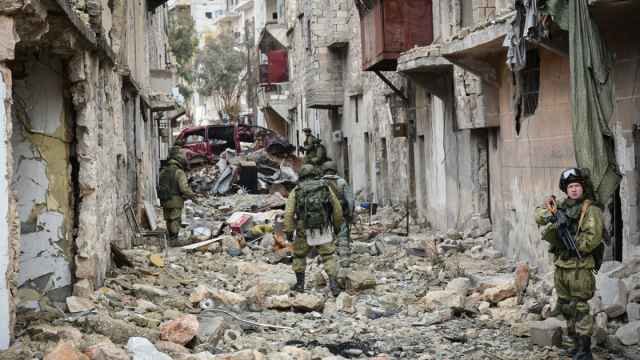Idlib Governorate, SYRIA — A dry wind rushes through the meanders of destroyed streets, bringing up the acrid smell of smoke laden with gasoline. In the distance, a minaret overlooks the dome of a half-destroyed mosque.
“This building was destroyed by a Russian airstrike,” says Abu Musa, pointing out sites of Russian bombings around Idlib, many of which, like his teacher’s house, hold personal significance for him.
Short and stocky, he confidently drives a decrepit yellow car with no license plates.
“We stole it from Hezbollah during the capture of Damascus in December,” Abu Musa explains with a triumphant smirk, referring to the Iran-backed Shiite militia based in Lebanon that fought alongside the Assad regime.
At his feet, an M16 rifle rests between the steering wheel and the gear lever. His face is framed by a small, wispy, copper-tinged beard. Abu Musa, who calls himself a mujahid, a religious fighter, wears a greenish kufi tightly fitted to his head, a traditional Islamic head covering symbolizing devotion and loyalty to Allah.
Born in Russia to a Russian mother and a Dagestani father, he chose Islam from a young age. While studying the Quran in Egypt between 2012-2013, he decided to join the jihad in Syria — to fight against the oppressive regime of Bashar al-Assad.
After a stint in the ranks of the rebel group Jabhat al-Nusra, Abu Musa began serving as a sniper in a Russian-speaking unit within Hay’at Tahrir al-Sham (HTS).
Alongside Abdullah, a fighter from Tajikistan who took command after the loss of five previous leaders, they fought through the most intense phase of the civil war, battling both Assad’s Russian-backed forces and ISIS.
Since 2020, their unit has held the front line in southern Idlib, eventually playing a key role in HTS’s decisive offensive against the regime in December.
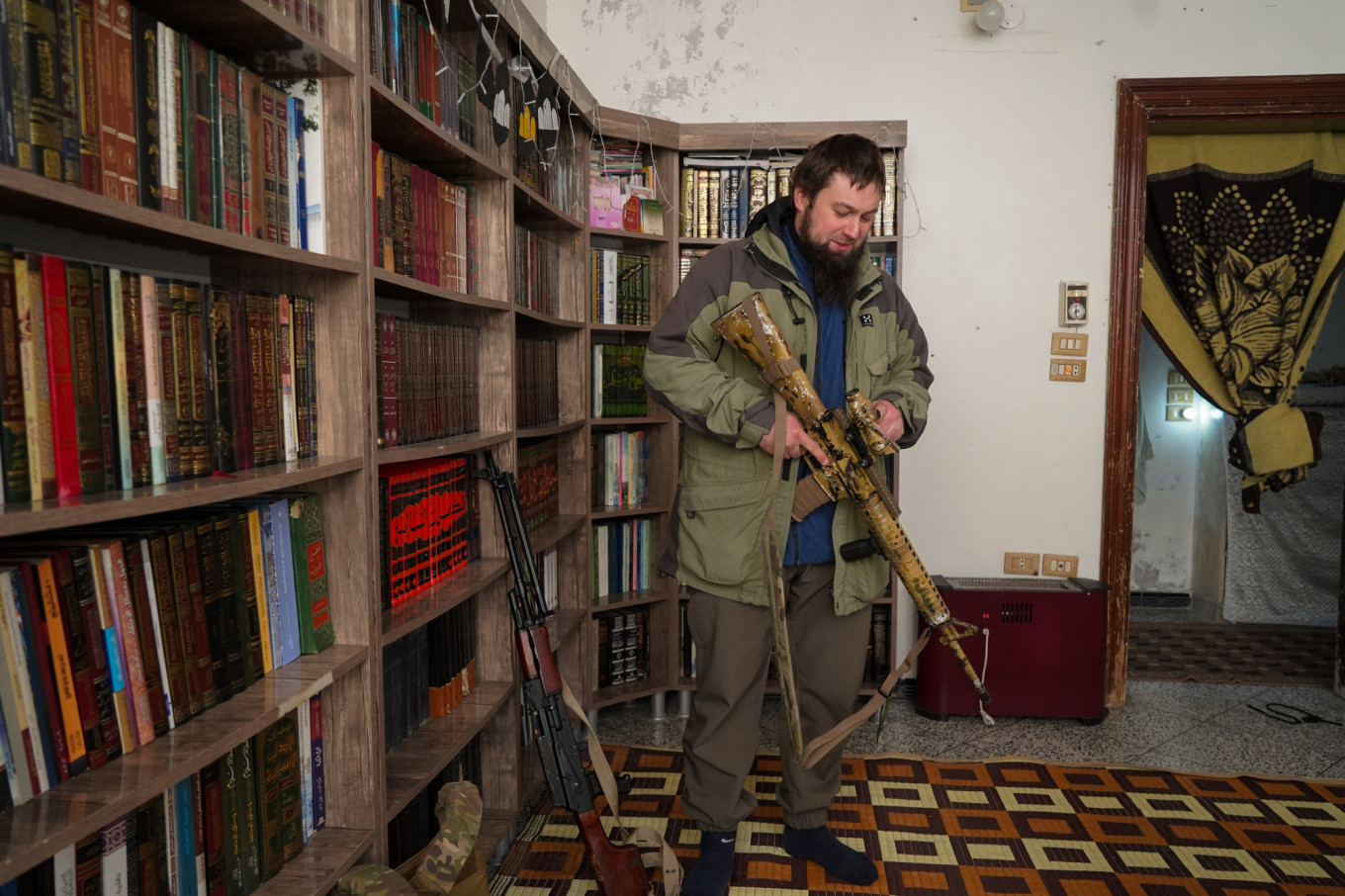
HTS is designated as a terrorist organization by the UN, U.S., EU, Britain and others. A senior UN official said in December that the body would consider removing the terrorist designation if HTS formed a truly inclusive transitional government.
A war for religion, or against occupation
Unlike many Chechen and Dagestani fighters who came to Syria after the defeat in the Second Chechen War, Abu Musa and his now-commander Abdullah primarily came to fight for religious reasons.
This is not the case for Rizvan Kubakaev, one of Abu Musa’s friends, who we met next to a car service and a highway rest stop.
Born in 1984 in Russia’s Stavropol region and belonging to the Nogai ethnic group, a Turkic-speaking Muslim minority from southern Russia, Kubakaev was only 10 years old when the First Chechen War broke out between Moscow and Chechen separatists.
“My sister’s husband, Kamil, was killed. He was fighting alongside the Chechen resistance. After that, FSB [Russian security service] agents came to our home. They beat me, tortured me, electrocuted me, broke my ribs. My parents were also assaulted. They tried to force me to give information. I was still a child,” he says.
After years of repression, Kubakaev fled Russia in 2014 — first to Turkey, then to Syria.
“I understood that everywhere Russia wages war, in Chechnya, in Ukraine, in Syria, it’s the same fight,” he explains. “I didn’t come here [to Syria] for jihad, but to fight against occupation.”
From Idlib, he leads what he calls an “information war” against Russian imperialism. Through Telegram, YouTube and Instagram, he addresses the Nogai community and its diaspora to raise awareness of what he sees as their silent erasure.
Learning from Russia’s war and Ukraine’s defense
Walking through the stony hills of the former front line about an hour’s drive from Idlib, Commander Abdullah, like Abu Musa, considers himself above all a mujahid (a religious fighter), but takes satisfaction in Russia’s setbacks in Ukraine.
He views these setbacks as a contributing factor to what he calls HTS’s rapid advance against Damascus and the weakening of Assad’s regime. Which is why his unit studied Russia’s military campaign in Ukraine with particular attention.
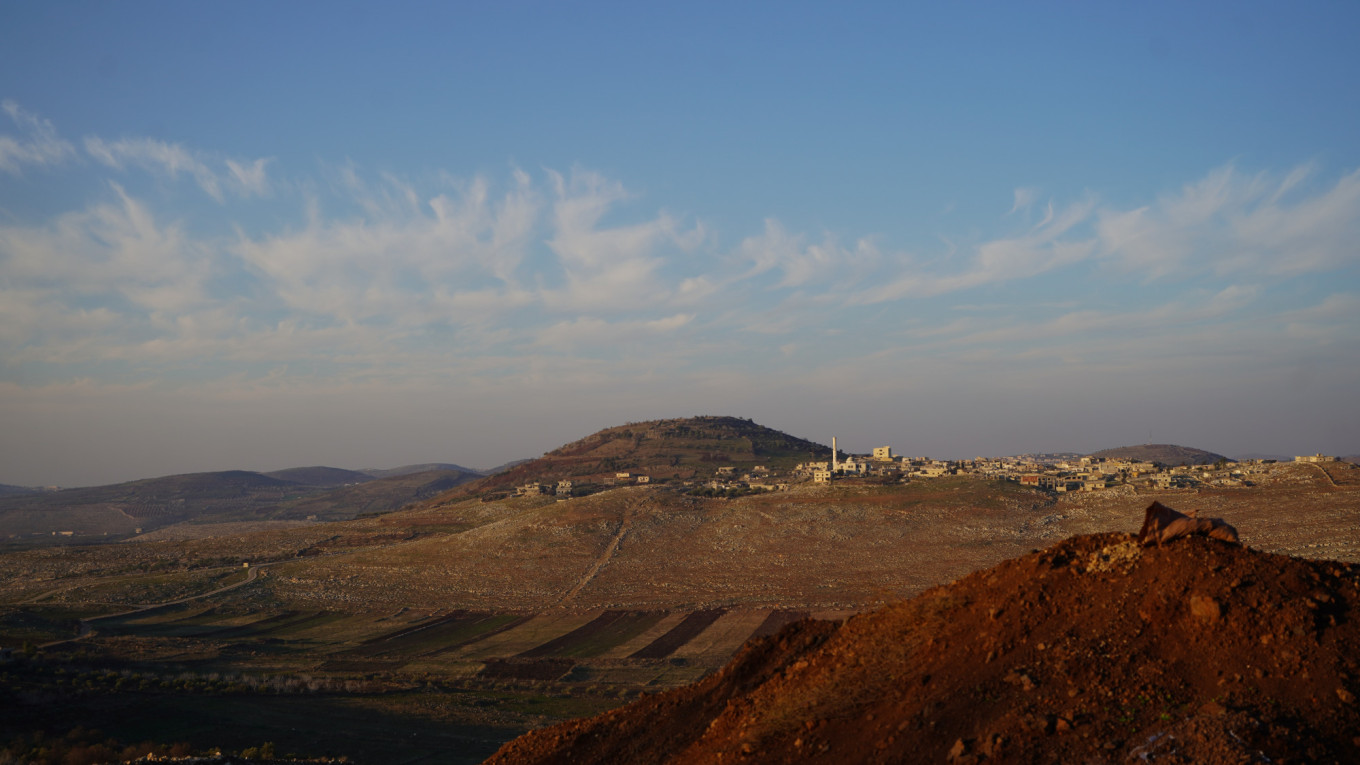
Before the invasion of Ukraine, Russian aircraft dominated the Syrian skies, limiting rebel movement and striking with impunity. But as Moscow redirected its military capacity toward Europe, its presence in Syria thinned, creating tactical openings that HTS quickly exploited.
“When the war in Ukraine broke out, we also studied Ukrainian tactics. Their terrain is different, wooded, humid, so it’s hard to apply here. But what stood out most were the drones,” Abdullah says, his gaze intense, after a visit to the former front line where he once fought.
“Ukraine has the means to mass-produce. We, without any aid, had to buy and import a few devices, especially kamikazes and Mavics — barely 50 altogether. It’s not much, but we used them to the max.”
With a few dozen drones, his unit compensated for their lack of aerial intelligence and perfected its tactics — from mapping enemy bases to coordinated strikes.
“For us, it was a vital reconnaissance tool. A real turning point,” Abdullah says.
“We strike from the sky, then enter on the ground. We fight for Allah, but we learn from everywhere,” he says.
Abu Musa confirms that the war in Ukraine showed that the Russians could retreat — and gave them hope that even an empire could fall.
No way back
With Assad defeated and taking refuge in Russia, the two fighters have had no intention of returning home.
Convicted in Russia for “terrorism” and “inciting terrorism,” Abu Musa abandoned the idea of returning as early as 2014.
“I was charged with an offense punishable by 15 to 20 years in prison. My mother sent me the decision because the trial was held without me, and my parents were summoned to court,” he explains.
In his old apartment, Abu Musa proudly shows off his library, mainly composed of religious books. From the top of the shelf, he pulls down his personal weapons and sets them against the rows of books.
“I like American weapons, not Russian ones,” he says, a smile frozen on his face as he shows off his acquisitions.
Like Kubakaev, he too is waging an information war. Active on YouTube, Abu Musa records Russian‑language videos on shaping an Islamic worldview.
“When we’re not fighting, my role is to call people to Islam and explain its foundations. I also give lessons to our Russian-speaking militia, either in mosques, at our bases or at their homes.”
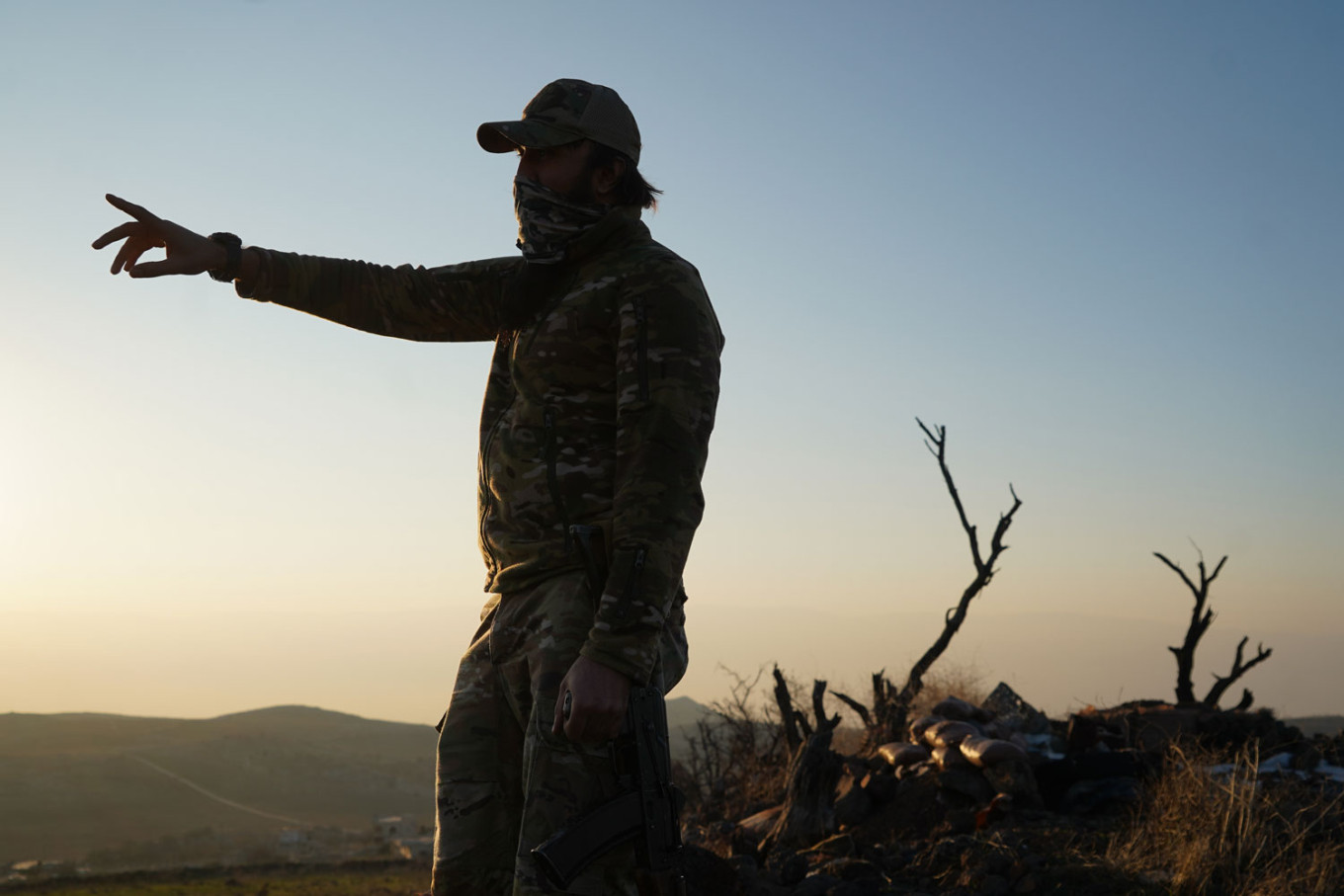
He sometimes receives messages from Russians facing mobilization to fight in Ukraine, asking him: “What should I do?” Abu Musa advises them to flee to Turkey or, if they can’t stay there, to come to Idlib. He acknowledges that the route is difficult: “They’ll face problems along the way.”
Kubakaev, too, tries as best he can on his social networks to discourage anyone from joining the Russian army.
“We are a small people [Nogai]. If our youth die in Ukraine, it’s our silent genocide,” he says. “I beg them not to take part in this war. It’s not ours.”
He says he receives no funding or subsidies for his work, viewing it simply as his life’s mission. His project is neither an NGO nor officially registered, but that has not stopped Russian authorities from designating it as a “terrorist” organization.
“They told my parents they would torture them on camera if I didn’t stop [the work],” he says.
He adds that the FSB has threatened his family in an attempt to pressure him into returning. But he has no intention of going back.
“I do not belong to the Russian empire,” he concludes calmly. “I belong to a people who want their freedom.”
A Message from The Moscow Times:
Dear readers,
We are facing unprecedented challenges. Russia's Prosecutor General's Office has designated The Moscow Times as an "undesirable" organization, criminalizing our work and putting our staff at risk of prosecution. This follows our earlier unjust labeling as a "foreign agent."
These actions are direct attempts to silence independent journalism in Russia. The authorities claim our work "discredits the decisions of the Russian leadership." We see things differently: we strive to provide accurate, unbiased reporting on Russia.
We, the journalists of The Moscow Times, refuse to be silenced. But to continue our work, we need your help.
Your support, no matter how small, makes a world of difference. If you can, please support us monthly starting from just $2. It's quick to set up, and every contribution makes a significant impact.
By supporting The Moscow Times, you're defending open, independent journalism in the face of repression. Thank you for standing with us.
Remind me later.

